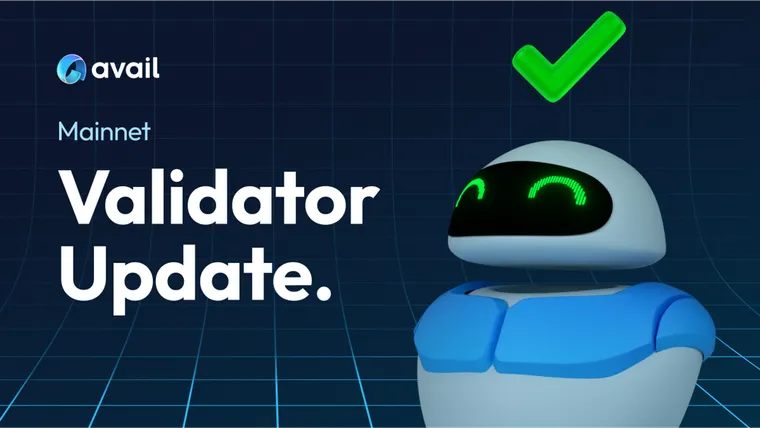TL;DR
- Avail’s network is permissionless. Anyone is free to acquire AVAIL tokens and follow the step-by-step guide to become a validator.
- Avail’s blockchain uses Nominated Proof of Stake (NPoS), a mechanism which distributes rewards evenly to active validators regardless of stake.
- Genesis validators were selected to help bootstrap the network based on their reliability and strong performance during testing, including Testnet 1, Kate, Goldberg and Turing.
- The Phragmén election algorithm irons out stake across active validators so that a few validators with a large stake cannot control the network.
- Validators have a higher chance of being selected to produce blocks and earn a share of the rewards if they have good performance and more AVAIL tokens staked.
Mainnet Validator Update
Here’s some important updates and useful information for mainnet validators and the community ahead of the Avail DA mainnet launch.
Those validating and staking on most blockchains are likely familiar with Delegated Proof of Stake (DPoS) blockchains. Avail uses Nominated Proof of Stake (NPoS), which is a similar but different mechanism that leads to better decentralization outcomes, and less control going to a few dominant validators. We’ll share what this means for mainnet validators and what you might expect to see over the coming weeks and months.
What is NPoS?
Nominated Proof of Stake is a mechanism that’s designed to provide equal rewards for validators to improve decentralization. Staking more tokens increases the chances that a validator will be included in an active set, but the amount staked and the staking rewards get spread out among active validators. This is not only more fair for validators, it also leads to better decentralization outcomes for the network.
NPoS has become one of the most decentralized PoS based blockchain designs available today. It was specifically chosen for the Avail network because it avoids many of the centralization tendencies that surface on DPoS based blockchains over time.
How is NPoS different from DPoS?
With DPoS, more staked tokens means more rewards. This self reinforcing loop, coupled with network effects, leads to a situation where stake becomes centralized around a small set of validators. This unhealthy spread of stake can easily lead to challenges if the primary group of validators perform poorly. It also increases network vulnerabilities because it’s a lot easier for a small group of people to coordinate and take control of the network.
These risks are mitigated in NPoS networks like Avail’s. Through onchain selection methods and a mechanism that disperses stake and rewards across validators, NPoS ensures a democratic and healthy chain environment. This has now paved the way for Avail to provide a decentralized and credibly neutral unification layer for Web3.
Wen Mainnet?
The Avail network has gone through multiple rounds of thorough testing and is very close to being deployed on mainnet. Throughout the testing phases, Avail’s network has achieved solid results with high numbers of validators.
During Goldberg’s incentivized testnet (now deprecated), the Avail network reached 330 validators, and the Turing testnet which launched recently, has quickly climbed to 120. It’s worth noting that the Turing testnet is not incentivised and will continue being used as Avail’s testnet moving forward.
What does the rollout look like for Avail Mainnet Validators?
As with most chains, Avail will actively monitor the network and carefully increase the size of the active validator set with a gradual deployment. The Phragmén election algorithm built into NPoS irons out stake across active validators so that a small number of validators cannot take control of the network like they can with DPoS based systems. Even if a few validators take control of a lot of the stake, the Phragmén election algorithm will work to spread it out across the active validator set.
Avail’s network is permissionless. Anyone is free to acquire AVAIL tokens and follow the step-by-step guide to become a validator. Validator nodes with a sufficient AVAIL bond will join the waitlist and be selected by the network as the number of active validators increases.
Here’s a look at what we can expect for the Avail Mainnet rollout:
- The initial active validator set will start with 40-50 validators.
- This will increase by at least 2X to 100 in the next 6 months.
- The goal is to reach 250-300 validators on mainnet within year 1.
- The north star and eventual goal for the network is to reach 1,000 active validators.
How do Avail Validators remain Decentralized?
It’s paramount that the Avail Network provides robust decentralization guarantees, as this is directly translated up to the blockchains built on top. There are some key features baked into NPoS which encourage and maintain decentralization among validators. As a validator, this all happens without extra effort, however it is useful to be aware of what is happening.
How are Validators Selected for Each Block Production Period?
Validators are chosen using a combination of factors including the amount of tokens staked and their performance history. Validators are chosen to validate for an era which is a predefined number of sessions. During an era validators are part of the active set, validating blocks and receiving rewards. It’s worth noting the active set of validators is subject to change every era.
Who are Nominators?
A nominator is an AVAIL token holder who doesn’t run a validator but instead nominates their tokens to be staked by others. The nominator can choose up to 16 different validators to stake their tokens with. When nominating validators, nominators directly rank and prioritize the validator(s) they want to support.
How do Validator Rewards get Distributed?
Rewards are distributed more or less evenly between the active validators for an era. Taking the example below of 3 validators, with small, medium and large amounts of tokens staked, all of these would receive a near on equal amount of rewards for participation in each era.
The Phragmén election algorithm ensures a democratic and healthy chain by not always taking the full stake of a validator. In the example above where validator V3 has a large stake, only a portion of the total stake might be used, and V3 gets better yield by reducing its self stake and nominating some of that to V1. This results in an allocation similar to the example below.
Validators with a lower initial stake, actually receive more rewards proportionately than larger staked validators. This means the overall stake of lower staked validators can grow, leveling out the stake discrepancies in the set over time.
Because rewards get distributed evenly among active validators, this also ensures that a nominator is incentivised to nominate to a validator with a lower total stake than a larger validator as their own rewards will be greater.
The role of Nominators
Nominators play a much more active role in NPoS than delegators do in DPoS. Nominators are encouraged to find and vet quality validators as they are also vulnerable to slashing if they nominate their tokens to validators with poor or reckless performance. They are also encouraged to distribute stake across the validator set to increase their likelihood of gaining staking rewards.
Token stakers looking for more of a ‘set it and forget it’ approach can nominate their tokens to a nomination pool which takes up the active role in return for a fee. Check out this staking guide for more.
NPoS and the Nakamoto Coefficient
The Nakamoto Coefficient compares the decentralization of different blockchains. It attempts to highlight the smallest number of independent entities that can shut down or disrupt a blockchain network. Avail is expecting to achieve a market leading Nakamoto Coefficient as the NPoS network matures.
Avail also supports a distributed network of light clients that maintain a replica of the Avail blockchain providing additional decentralization guarantees and resilience.
Future Mainnet Validator Updates
To keep up to date with the latest updates for validators follow the #validator-announcements channel on Discord and follow Avail on X.


